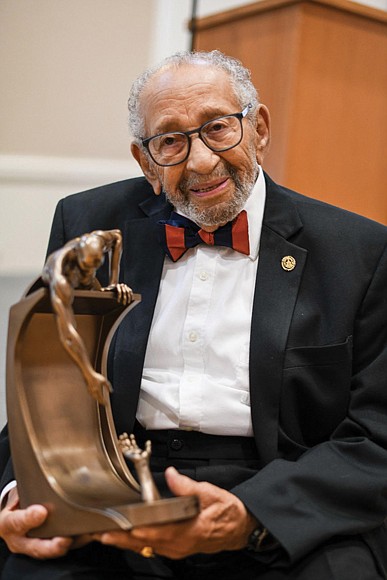Dr. Linwood Jacobs who opened doors for Black Greek organizations at UVA, dies at age 90
Additional roles included community college dean and Gilpin Court mental health provider
Jeremy M. Lazarus | 1/4/2024, 6 p.m.
Dr. Linwood Jacobs is credited with spearheading the establishment of Black fraternities and sororities at the University of Virginia.
And later he focused on student development as the dean of students at J. Sargeant Reynolds Community College and helped start a mental health services company based in Gilpin Court.
“He was an active and energetic man with multiple interests,” said his niece, Karen K. Brown-Taylor. “He spoke directly, but his speech masked a warm, humble man who would do anything he could for you.”
E. Rick Copeland, who knew Dr. Jacobs as a Kappa Alpha Psi Fraternity brother, said, “He embodied the values of integrity, trustworthiness, courage and honesty.”
Dr. Jacobs died at age 90 from complications of cancer he had battled for several years on Wednesday, Dec. 27, 2023.
His life will be celebrated at 11 a.m. Monday, Jan. 15, at Ginter Park Presbyterian Church, 3601 Seminary Ave., his family said.
Just a few weeks before his death, the University of Virginia honored him as “the silent disrupter” who had helped make the school more hospitable for Black students, faculty and staff during his tenure as an assistant dean of students with oversight of fraternities and sororities.
Hired in 1971 as the first Black administrator in the student affairs office, Dr. Jacobs is credited with founding the Eta Sigma Chapter of Kappa Alpha Psi Fraternity on the campus and also assisting and encouraging five other Black fraternities and sororities to start campus chapters.
The recognition event took place on the occasion of the 50th anniversary of the founding of those chapters.
He also is credited with ensuring Black students were considered for resident adviser positions in undergraduate dorms.
Still Black life was not easy, and Dr. Jacobs took part in a march to the president’s house in 1975 to protest the continuing harassment and mistreatment of Black educators, staff and students at the school still struggling with integration.
The new president, Dr. Frank L. Hereford Jr., and the Board of Visitors responded by building the Luther P. Jackson House as the home for the Office of Afro-American Affairs, for which Dr. Jacobs authored the initial charter.
A Richmond native who had made his home in Mechanicsville, Dr. Jacobs grew up in the Newtown neighborhood in South Side. There, as a youth, he made extra money by delivering prescriptions for a Hull Street pharmacy.
Dr. Jacobs, a graduate of Richmond’s Armstrong High School, was an active member of the Negro History Club, Cadet Corps, and the baseball and track teams.
After high school, he enrolled at Virginia State University where he was a member of the Virginia State Players, the track team and a football trainer. While at VSU, Dr. Jacobs also became a member of Kappa Alpha Psi. Dr. Jacobs’ VSU studies were interrupted when he was drafted to serve in the U.S. Navy. After his military stint, he returned to VSU where he graduated in 1960. He later enrolled at the University of Virginia where he earned his master’s degree.
Ms. Brown-Taylor said her uncle once told her that it was not easy, recalling that in 1962 that he was barred from buying books from the campus bookstore and had to enlist the help of a white student to make the purchases for him.
After graduating, Dr. Jacobs returned to Richmond where he served as a social worker in public schools for eight years. He returned to U.Va., to secure his doctorate, while also gaining a position in the student affairs office.
Four years later, he returned to Richmond to serve as assistant principal of Woodville Elementary and later as dean of student development at J. Sargeant Reynolds until his retirement in the late 1990s.
Projects such as renovating and renting houses in Richmond kept Dr. Jacobs busy after he retired.
He also operated a group home, Frontier Family Services, and was clinical director for more than 10 years for the Alliant Consortium, a mental health program based at the Calhoun Center that he launched with family members around 2004.
Boating, fishing and restoring vintage cars rounded out his many activities.
Maintaining a social-justice conscience stayed with Dr. Jacobs long after he retired. He was a member of the Richmond Branch NAACP, the Richmond Crusade for Voters, and volunteered with Tots and Teens of Richmond and the Boys and Girls Clubs of Richmond.
And he never forgot Charlottesville, where he often traveled to serve on U.Va. committees that distributed scholarships to students and to lend his expertise to other community-oriented programs.
Survivors include his wife, Dr. Margaret Lucas Jacobs; daughter Jocelynn E. Jacobs; and three grandchildren, Dilynn A. Wade, James Elliott-Wallace and Rashad Davis-Gladney.







